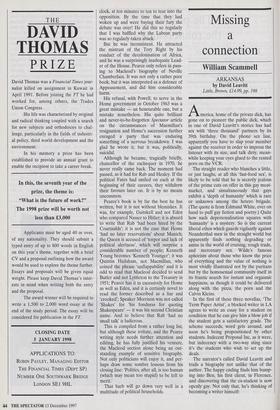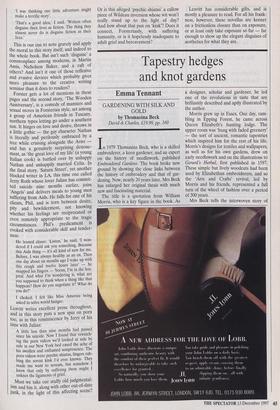Missing a connection
William Scammell
ARKANSAS by David Leavitt Little, Brown, £14.99, pp. 198 America, home of the private dick, has gone on to pioneer the public dick, which in one of David Leavitt's stories has had sex with 'three thousand' partners by its 39th birthday. On the phone sex line, apparently you have to slap your member against the receiver in order to impress the listener with its size, and talk dirty, mean- while keeping your eyes glued to the rented porn on the VCR.
The straight reader who blanches a little, or just laughs, at all this last-food sex', is likely to be told that he is secretly jealous of the prime cuts on offer in this gay meat- market, and simultaneously that gays exhibit a 'depth of humanity' which is rare or unknown among the hetero brigade. (The quote is from Edmund White, ever on hand to puff gay fiction and poetry.) Quite how such depersonalisation squares with 'humanity' is a mystery. So is the current liberal ethos which guards vigilantly against Neanderthal men in the straight world but apparently finds nothing degrading or amiss in the world of cruising, rough trade, and mercenary sex. Wilde's famous aphorism about those who know the price of everything and the value of nothing is most vividly illustrated not by the puritans but by the homosexual community itself in its frantic search for instant and orgasmic happiness, as though it could be delivered along with the pizza, the porn and the Calvin Kleins.
In the first of these three novellas, 'The Term Paper Artist', a blocked writer in LA agrees to write an essay for a student on condition that he can give him a blow job if the student gets a satisfactory grade. The scheme succeeds, word gets around, and soon he's being propositioned by other students. Indecent Proposal Inc, as it were, but indecency with a two-way sting since it's the students who wish to set up the deals.
The narrator's called David Leavitt and trails a biography not unlike that of the author. The happy ending finds him bump- ing into Ben, his first client, in Florence, and discovering that the ex-student is now openly gay. Not only that, he's thinking of becoming a writer himself:
'I was thinking our little adventure might make a terrific story'.
'That's a good idea,' I said. 'Writers often disguise their lives as fiction. The thing they almost never do is disguise fiction as their lives.'
This is our cue to note gravely and apply the moral to this story itself, and indeed to the whole book. But isn't such 'disguise' a commonplace among moderns, in Martin Arms, Nicholson Baker, and a raft of Others? And isn't it one of those reflexive and evasive devices which probably gives more pleasure to the creative writing seminar than it does to readers?
Forster gets a lot of mentions in these pages and the second story, 'The Wooden Anniversary', is a comedy of manners and sexual mores in Forsterian style, set among a group of American friends in Tuscany, northern types letting go under a southern sun. It hinges on love and desire, throws in a httle gothic — the gay character Nathan is literally and perilously embraced by a tree while cruising alongside the Arno — and has a genuinely surprising denoue- ment, as 'the great love of my life' (a young Italian cook) is battled over by unhappy Nathan and unhappily married Celia. In the final story, 'Saturn Street', yet another blocked writer in LA, this time one called Jerry Roth whose lover Julian has commit- ted suicide nine months earlier, joins 'Angels' and delivers meals to young men suffering from Aids. He falls for one of his Clients, Phil, and is torn between desire, Pity and bewilderment, not knowing Whether his feelings are reciprocated or even remotely appropriate to the tragic circumstances. Phil's predicament is evoked with considerable skill and tender- ness:
He leaned closer. 'Listen,' he said, 'I won- dered if I could ask you something. Because this Aids thing — it's all kind of new for me. Before, I was always healthy as an ox. Then one day about six months ago I wake up with this cough and twelve hours later' — he snapped his fingers — 'boom, I'm in the hos- pital. And what I'm wondering is, what are you supposed to think when a thing like that happens? How do you negotiate it? What do you do?'
I choked. I felt like Miss America being asked to solve world hunger.
Leavitt writes excellent prose throughout, and in this story puts a new spin on porn too, as in this reminiscence by Jerry of his time with Julian: A little less than nine months had passed since his suicide. Now I found that rewatch- ing the porn videos we'd looked at side by side in our New York bed eased the ache of his swollen and enflamed nonpresence. The porn videos were psychic shiatsu, fingers rub- bing the sorest kink I'd ever known. They made me want to scream, but somehow I knew that only by suffering them might I unknot the ligaments of grief.
Must we take our stuffy old judgmental- ism and bin it, along with other out-of-date Junk, in the light of this affecting scene? Or is this alleged 'psychic shiatsu' a callow piece of Wildean inversion whose wit won't really stand up to the light of day? And how about that pun on 'kink'? Does it connect, Forsterianly, with suffering humanity, or is it hopelessly inadequate to adult grief and bereavement? Leavitt has considerable gifts, and is mostly a pleasure to read. For all his frank- ness, however, these novellas are keener on a frictionless closure than on exposure, or at least only take exposure so far — far enough to show up the elegant disguises of aesthetics for what they are.



















































































 Previous page
Previous page